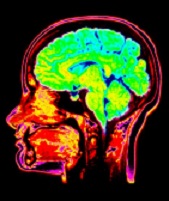Professor Karín Lesnik-Oberstein writes:
My research in the past few years has primarily been concerned with critiquing ideas of neuroscience (brain scans) in relation to literature and children’s literature. Many Humanities scholars have recently been very excited by the idea that brain scans made with new, more refined, brain scan machinery (such as the FMRI machine we also have at Reading) might give information on how readers respond to literature. The pretty coloured pictures the brain scan machines make indicate increased rates of blood-flows and oxygenation to parts of the brain at certain moments, and the machines can show these changes ‘in action’ so that researchers have asked test-subjects to do things or look at certain things to see how and if this changes the flows. The researchers then draw conclusions about which parts of the brain do what and why.
Unfortunately, most of this research is very problematic as it relies on all kinds of pre-set assumptions about what is being looked at, how to define (aspects of) ‘literature’ and how ‘responses’ work. My research analyses out these problems and their consequences. Last Summer Term, I was asked to give a ‘Marie Curie’ Guest Seminar on this topic at the University of London’s Queen Mary Westfield College at the kind invitation of the Marie Curie Fellow there, Dr Kirill Postoutenko , for his seminar series on the wider theme of ‘Sociological Criticism Inside Out: Literature and Its Environment’. The Marie Curie Fellowships and seminars are a European-wide funding scheme for researchers (http://ec.europa.eu/research/mariecurieactions/ ). I gave my lecture there on May 13th 2013 on my article ‘Children’s Literature, Cognitivism and Neuroscience, or, Capitalism and/ as the Return to the Same’.
I really enjoyed giving this seminar as the academics and PhD students present were from a wide range of backgrounds, including Russian and German Literature studies, for instance, and they were very open-minded about considering new fields and new ideas. It was a real pleasure to engage in discussion with them.

